Gay Tourism Sri Lanka is becoming increasingly popular, but is it safe and welcoming? SIXT.VN provides expert travel advice and services to ensure a smooth and enjoyable trip to Sri Lanka, with a focus on safety and cultural sensitivity. Discover Sri Lanka’s vibrant culture, stunning landscapes, and hidden gay-friendly spots with confidence. Let us help you plan a memorable journey with safe transport options, comfortable accommodations, and insightful local guidance, ensuring you experience the best of Sri Lankan hospitality.
1. What are the LGBTQ+ Rights in Sri Lanka?
Although homosexuality is technically illegal in Sri Lanka, the laws are largely unenforced. Section 365 of the Sri Lankan Penal Code, dating back to 1886, criminalizes “carnal intercourse” with potential penalties of up to 10 years in prison and fines. Despite this law, the Supreme Court of Sri Lanka has declared these laws dormant. According to Pink News, the Sri Lankan government has yet to repeal these laws. While LGBTQ+ travelers are generally safe, discretion is advised.
1.1 What are the historical roots of anti-gay laws in Sri Lanka?
The anti-gay laws in Sri Lanka trace back to British colonial rule in 1886. These laws, enshrined in Section 365 of the Penal Code, criminalized same-sex relations, reflecting the Victorian-era attitudes prevalent during that time. According to legal scholars at the University of Colombo, these laws were imposed without considering the local cultural context, disrupting traditional social norms. Despite changes in societal attitudes globally, Sri Lanka has yet to repeal these colonial-era laws, even though many other former British colonies have done so.
1.2 How do current Sri Lankan laws affect LGBTQ+ locals and tourists?
Current Sri Lankan laws, while largely unenforced, create a challenging environment for LGBTQ+ locals. The existence of Section 365 of the Penal Code perpetuates social stigma and can be used to justify discrimination and harassment. For tourists, this means exercising caution and discretion. According to a 2021 report by Human Rights Watch, LGBTQ+ individuals in Sri Lanka face systemic discrimination in employment, housing, and healthcare. While tourists may not experience direct legal repercussions, the social climate necessitates sensitivity.
1.3 What is the Sri Lankan government’s stance on LGBTQ+ rights?
The Sri Lankan government’s stance on LGBTQ+ rights remains ambiguous. While the Supreme Court has declared anti-gay laws dormant, the government has yet to repeal them. Public officials often express conservative views, reflecting the broader societal attitudes. In 2018, Pink News reported on homophobic statements made by government officials, indicating a lack of political will to advance LGBTQ+ rights. This inaction reinforces discriminatory practices and contributes to the marginalization of the LGBTQ+ community.
1.4 How does the decriminalization of homosexuality in India impact Sri Lanka?
India’s decriminalization of homosexuality in 2018 has placed indirect pressure on Sri Lanka to reconsider its own anti-gay laws. As a neighboring country with close cultural and economic ties, India’s progressive legal reform highlights Sri Lanka’s lagging progress. According to a study by the Centre for Policy Alternatives, India’s decision has sparked public discussions and advocacy efforts within Sri Lanka, pushing for similar legal reforms. However, significant political and social resistance remains, making immediate legal changes unlikely.
1.5 What advocacy groups are working to advance LGBTQ+ rights in Sri Lanka?
Several advocacy groups are dedicated to advancing LGBTQ+ rights in Sri Lanka, including The Equal Ground, a leading organization that has been hosting Colombo Pride events for over 15 years. These groups work to raise awareness, provide support, and advocate for legal reforms. According to their reports, these organizations have faced significant challenges, including intimidation and pushback from conservative elements in society. Despite these obstacles, their efforts are crucial in fostering a more inclusive and accepting environment for the LGBTQ+ community.
2. Is Sri Lanka Safe for LGBTQ+ Travelers?
Yes, Sri Lanka is generally safe for LGBTQ+ travelers, but discretion is advised. Sri Lankans are known for their hospitality and curiosity towards foreigners. Although anti-gay laws exist, they are not strictly enforced. According to Nomadic Boys, a gay couple felt safe and welcomed during their travels in Sri Lanka, even booking double beds without issues. However, LGBTQ+ travelers should avoid public displays of affection and be mindful of local customs.
2.1 What are the general safety tips for LGBTQ+ travelers in Sri Lanka?
General safety tips for LGBTQ+ travelers in Sri Lanka include:
- Avoid Public Displays of Affection (PDAs): Public displays of affection can attract unwanted attention due to conservative social norms.
- Research Accommodations: Look for gay-friendly hotels and guesthouses known for their inclusive policies.
- Be Aware of Your Surroundings: Stay vigilant in public spaces, especially in crowded areas or at night.
- Use Reputable Transportation: Utilize reliable transportation services like SIXT.VN to ensure safe and comfortable travel.
- Stay Informed: Keep up-to-date with local news and government advisories to be aware of any potential safety concerns.
2.2 How can LGBTQ+ travelers find gay-friendly accommodations in Sri Lanka?
Finding gay-friendly accommodations in Sri Lanka requires some research. Online platforms like Booking.com often list hotels with inclusive policies. Websites like Gay Sri Lanka Guide provide recommendations and reviews of gay-friendly establishments. Additionally, reading traveler reviews and contacting accommodations directly to inquire about their policies can help ensure a comfortable stay. Areas like Negombo are known to have more accepting establishments.
2.3 What are the potential risks for LGBTQ+ travelers in Sri Lanka?
Potential risks for LGBTQ+ travelers in Sri Lanka include social stigma and occasional discrimination. While the laws are largely unenforced, public displays of affection can attract negative attention. According to a 2019 report by the International Lesbian, Gay, Bisexual, Trans and Intersex Association (ILGA), LGBTQ+ individuals may face societal disapproval and verbal harassment. In rare cases, there may be encounters with law enforcement due to outdated laws.
2.4 How can LGBTQ+ travelers navigate local customs and traditions?
Navigating local customs and traditions in Sri Lanka involves respecting the conservative social norms. Dressing modestly, especially when visiting religious sites, is advisable. Avoiding public displays of affection and being mindful of cultural sensitivities are crucial. Engaging with locals respectfully and showing interest in their culture can foster positive interactions. Learning a few basic phrases in Sinhala or Tamil can also demonstrate respect and goodwill.
2.5 What resources are available for LGBTQ+ travelers needing assistance in Sri Lanka?
Resources available for LGBTQ+ travelers needing assistance in Sri Lanka include local LGBTQ+ organizations like The Equal Ground, which can provide support and information. Consular services from your home country can offer assistance in cases of emergency or legal issues. Online platforms like Travel Safe provide safety tips and resources for LGBTQ+ travelers worldwide. Additionally, maintaining contact with trusted friends or family can provide a support network.
3. What is the Gay Scene in Sri Lanka Like?
Due to anti-gay laws, there is no official gay scene in Sri Lanka. However, vibrant underground scenes exist in major cities like Colombo and beach towns like Negombo. Gay dating apps are popular for connecting with locals. According to Nomadic Boys, these apps essentially “become” the gay scene in countries like Sri Lanka.
3.1 Where are the unofficial gay hangouts in Colombo?
In Colombo, the absence of official gay venues means the scene is primarily underground. Gay dating apps are essential for connecting with locals and discovering ad hoc parties or events. Bars and restaurants linked to large hotel chains, such as the Cinnamon Grand Hotel and Juliana Hotel, are generally gay-friendly. Additionally, certain cruising spots include the bushes of Wellawatte Railway Station, Bambalapitya beach, and the Colombo Fort area after sunset.
3.2 What is the LGBTQ+ scene like in Negombo?
Negombo, a beach resort town north of Colombo, is known as one of the more liberal areas in Sri Lanka, fostering a small commercial LGBTQ+ scene. Gomez Place is a men-only resort, while Dickman and Binnacle resorts are also known for being gay-friendly. Popular bars include Rodeo Pub and Serendib Pub. Negombo Beach is a popular daytime hangout, and after sunset, “beach boys” (local escorts) can be found cruising along the beach.
3.3 How do gay dating apps function in Sri Lanka?
Gay dating apps like Grindr serve as crucial platforms for connecting with other LGBTQ+ individuals in Sri Lanka, where an open gay scene is limited. These apps facilitate social connections, enabling users to find friends, dates, and information about local events. According to user reports, these apps are essential for navigating the social landscape and finding community in a discreet and safe manner.
3.4 Are there any gay-friendly events or parties in Sri Lanka?
While there are few openly advertised gay-friendly events, Colombo Pride, organized by The Equal Ground, is an annual highlight featuring a pride parade, rainbow kite festival, and various performances. The Abhimani Queer Film Festival also showcases LGBTQ+ films from around the world. Smaller, ad hoc parties may be discovered through local contacts or gay dating apps. These events provide safe spaces for LGBTQ+ individuals to connect and celebrate.
3.5 How can LGBTQ+ travelers connect with the local queer community in Sri Lanka?
Connecting with the local queer community in Sri Lanka often involves utilizing gay dating apps and social media to find local contacts. Attending events like Colombo Pride or the Abhimani Queer Film Festival can provide opportunities to meet like-minded individuals. Being open and respectful while engaging with locals can also lead to meaningful connections. Additionally, supporting local LGBTQ+ organizations can help foster relationships within the community.
4. Top Experiences in Sri Lanka for Gay Travelers
Sri Lanka offers a wealth of cultural and natural experiences. From scenic train journeys through tea plantations to wildlife safaris, there is something for every traveler.
4.1 Scenic Train Journeys
The train journey from Kandy to Nuwara Eliya and then to Ella is breathtaking, taking you through lush tea plantations and cloud forests. According to Nomadic Boys, even with extensive train travel experience, these journeys are unparalleled.
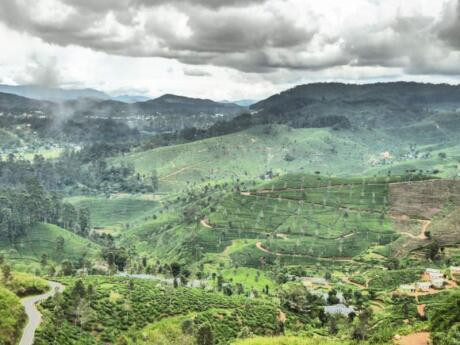 Train journey through tea plantations in Sri Lanka
Train journey through tea plantations in Sri Lanka
4.2 Wildlife Safaris
Yala National Park and Udawalawe National Park offer incredible wildlife safaris. Udawalawe is less frequented, providing a more intimate experience.
4.3 Trekking in Ella
Ella Rock provides stunning views and is a moderately challenging trek. Little Adam’s Peak is another popular, easier trek.
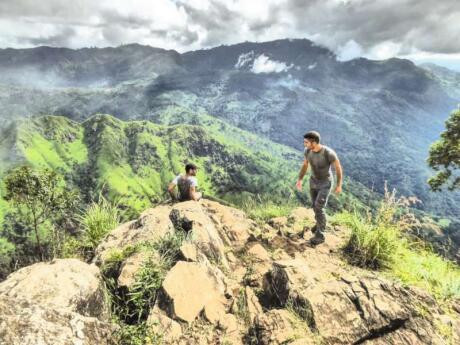 Active gay travellers to Sri Lanka will love the Ella Rock trek for some impressive views
Active gay travellers to Sri Lanka will love the Ella Rock trek for some impressive views
4.4 Whale Watching in Mirissa
Mirissa is ideal for spotting blue whales, especially between November and April. Responsible tour companies follow guidelines set by the Whale and Dolphin Conservation Society (WDCS).
4.5 Exploring Sri Lankan Food
Sri Lankan cuisine is diverse and flavorful. Taking a cooking class or cooking with local hosts can provide a deeper appreciation.
4.6 Tea Factory Visits in Nuwara Eliya
Nuwara Eliya, nicknamed “Little England,” offers tours of tea plantations, providing insights into the tea-making process.
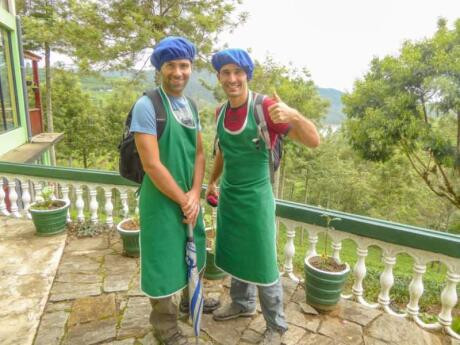 Visiting a tea factory is a fascinating way for gay travellers to Sri Lanka to learn about the country
Visiting a tea factory is a fascinating way for gay travellers to Sri Lanka to learn about the country
4.7 Temple of the Sacred Tooth Relic in Kandy
The Temple of the Sacred Tooth Relic is a significant Buddhist temple housing a tooth relic of the Buddha.
4.8 Beaches and Sunsets
Beaches like Mirissa and Unawatuna offer beautiful sunsets and surfing spots.
4.9 What cultural sites are LGBTQ+-friendly in Sri Lanka?
While no cultural sites are officially designated as LGBTQ+-friendly, many are welcoming to all visitors. Key sites like the Temple of the Sacred Tooth Relic in Kandy and the ancient city of Polonnaruwa are generally accepting of tourists, regardless of sexual orientation. However, it’s crucial to dress modestly and behave respectfully, especially in religious settings. Researching and choosing tour guides who are known for their inclusive attitudes can also enhance the experience.
4.10 What nature activities are recommended for LGBTQ+ travelers?
For LGBTQ+ travelers, nature activities like safaris in Yala and Udawalawe National Parks, trekking in Ella, and whale watching in Mirissa are highly recommended. These activities offer opportunities to experience Sri Lanka’s natural beauty while maintaining a sense of privacy and freedom. Choosing reputable tour operators that prioritize safety and respect can ensure a comfortable and enjoyable experience. Bird watching in Sinharaja Forest Reserve is another peaceful and inclusive activity.
4.11 What are some unique experiences that showcase Sri Lankan culture?
Unique experiences that showcase Sri Lankan culture include visiting tea factories in Nuwara Eliya, participating in a cooking class to learn about local cuisine, and attending a traditional dance performance. These activities offer immersive insights into Sri Lankan traditions and customs. Engaging with locals and showing genuine interest in their culture can lead to meaningful interactions and a deeper understanding of the country.
4.12 How can LGBTQ+ travelers ensure their safety during adventure activities?
To ensure safety during adventure activities, LGBTQ+ travelers should choose reputable tour operators with experienced guides. Checking reviews and verifying the operator’s safety record is essential. It’s also important to inform the guides of any health concerns or limitations. Carrying necessary safety gear, such as appropriate clothing, sunscreen, and insect repellent, is also advisable. Additionally, staying informed about weather conditions and potential hazards can help prevent accidents.
4.13 What are some romantic spots for LGBTQ+ couples in Sri Lanka?
Romantic spots for LGBTQ+ couples in Sri Lanka include the beaches of Mirissa and Unawatuna, which offer stunning sunsets and secluded areas. The hill country around Ella provides picturesque landscapes for romantic walks. Staying in boutique hotels or villas with private pools can offer a more intimate setting. Enjoying a quiet dinner overlooking the ocean or a couple’s massage at a spa can also create memorable experiences.
5. Pride and Gay Events in Sri Lanka
Due to anti-gay laws, exclusively gay events are limited. Colombo Pride and the ABHIMANI Queer Film Festival, both in June, are notable exceptions.
5.1 Atman Tribal Festival (January)
A week-long festival of art, music, and performances on one of Sri Lanka’s beaches, focusing on charity and eco-sustainable projects.
5.2 Galle Literary Festival (January)
A renowned literature festival in Galle Fort, featuring art exhibitions, talks, and workshops.
5.3 Sinhala & Tamil New Year (April)
Celebrated around April 13th or 14th, featuring religious activities and traditional foods.
5.4 Vesak Poya – Festival of Lights (May)
A festival celebrating the birth, enlightenment, and “nirvana” of Buddha, with homes decorated with lanterns and free food stalls.
5.5 Colombo Pride (June)
Organized by The Equal Ground, featuring a pride parade, rainbow kite festival, and performances.
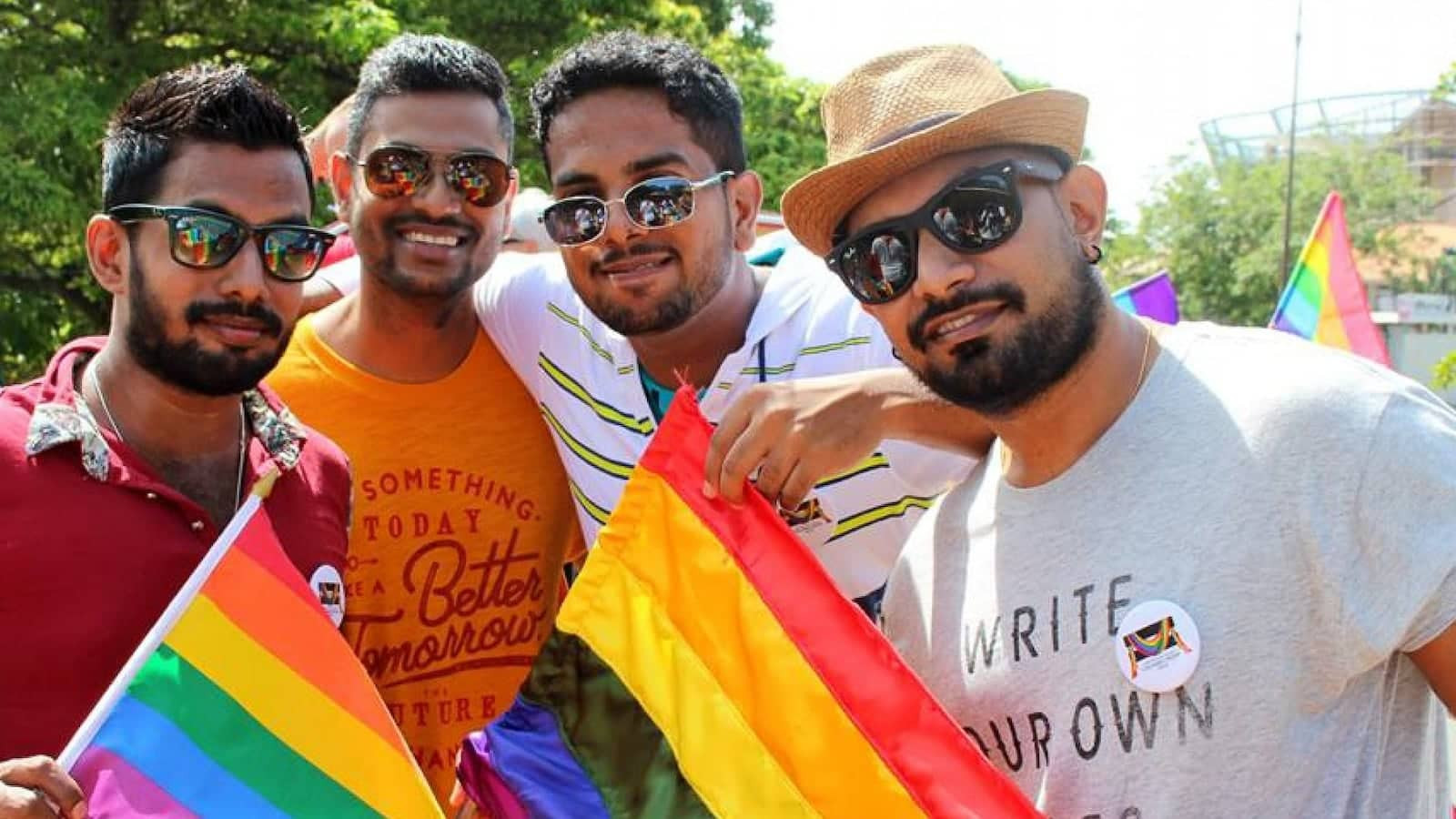 The boys of Colombo Pride LGBTQ event in Sri Lanka
The boys of Colombo Pride LGBTQ event in Sri Lanka
5.6 Abhimani Queer Film Festival (June)
Also organized by The Equal Ground, showcasing LGBTQ+ films from around the globe.
5.7 What are the key highlights of Colombo Pride?
Colombo Pride is the primary LGBTQ+ event in Sri Lanka, organized by The Equal Ground. Key highlights include the pride parade, which raises visibility and promotes LGBTQ+ rights. The rainbow kite festival is a colorful and inclusive celebration. Dance performances, art exhibitions, and photography displays showcase LGBTQ+ talent and stories. These events provide a safe and celebratory space for the community.
5.8 How does the Abhimani Queer Film Festival promote LGBTQ+ rights?
The Abhimani Queer Film Festival promotes LGBTQ+ rights by showcasing films that explore queer themes and experiences. It provides a platform for filmmakers from around the world to share their stories, raising awareness and fostering dialogue. The festival helps to challenge stereotypes and promote understanding and acceptance. By highlighting diverse voices, it contributes to the broader movement for LGBTQ+ equality.
5.9 What other cultural festivals in Sri Lanka are LGBTQ+-inclusive?
While not exclusively LGBTQ+-focused, festivals like the Galle Literary Festival and the Vesak Poya Festival of Lights are generally inclusive and welcoming to all visitors. The Galle Literary Festival promotes diverse voices and perspectives, while the Vesak Poya Festival, with its emphasis on peace and compassion, is open to everyone. These festivals offer opportunities to experience Sri Lankan culture in a welcoming environment.
5.10 How can LGBTQ+ travelers support local LGBTQ+ organizations in Sri Lanka?
LGBTQ+ travelers can support local organizations like The Equal Ground by attending their events, volunteering their time, or making donations. Raising awareness about these organizations through social media can also help. Supporting businesses that are known for their inclusive practices can further contribute to the community. By engaging with and supporting local LGBTQ+ groups, travelers can make a positive impact.
5.11 What resources are available for LGBTQ+ event organizers in Sri Lanka?
Resources for LGBTQ+ event organizers in Sri Lanka are limited but growing. Organizations like The Equal Ground offer guidance and support. International LGBTQ+ advocacy groups can provide resources and funding. Networking with other event organizers and sharing best practices can also be beneficial. Navigating legal and social challenges requires resilience and creativity.
6. Food and Drink in Sri Lanka
Sri Lankan cuisine is a highlight for many visitors.
6.1 Rice and Curry
Different from Indian curries, Sri Lankan curries are thinner and more heavily spiced.
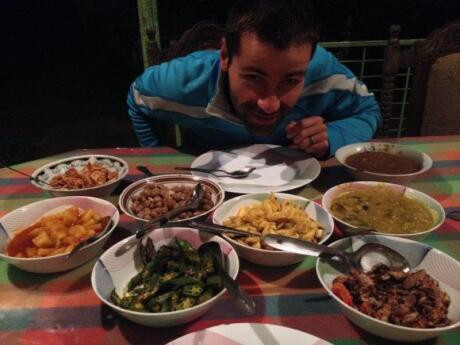 Sri Lankan curries are spicy and delicious, but not quite the same as the curries you
Sri Lankan curries are spicy and delicious, but not quite the same as the curries you
6.2 Deviled Prawns
Spicy and sweet, deviled prawns are a popular appetizer.
6.3 Egg Hoppers
Made from fermented rice flour and coconut milk, egg hoppers are a breakfast staple.
6.4 String Hoppers
Steamed rice flour noodles, often served with coconut gravy.
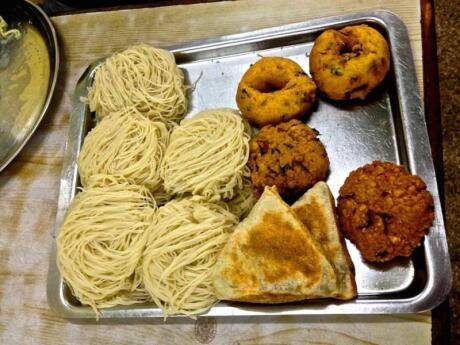 Rice hoppers are one of the kinds of tasty snacks you
Rice hoppers are one of the kinds of tasty snacks you
6.5 Kothu Roti
Shredded flatbread mixed with vegetables, egg, meat, and spices.
6.6 Watalappam
A coconut cream-based dessert with jaggery, eggs, and cashew nuts.
6.7 Arrack
Sri Lanka’s signature spirit, made from the distilled sap of coconut palm flowers.
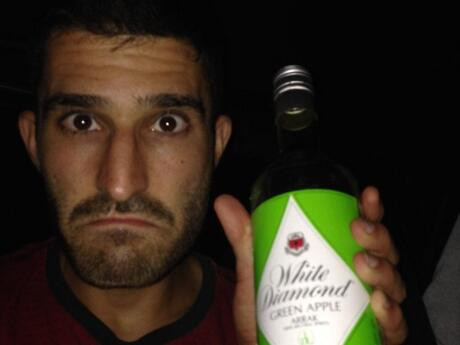 Arrak is a coconut-based alcoholic drink you have to try when in Sri Lanka!
Arrak is a coconut-based alcoholic drink you have to try when in Sri Lanka!
6.8 Tea
Sri Lanka is the world’s fourth-largest producer of tea.
6.9 What are some must-try Sri Lankan dishes for LGBTQ+ travelers?
Must-try Sri Lankan dishes for LGBTQ+ travelers include rice and curry, deviled prawns, egg hoppers, kothu roti, and watalappam. These dishes offer a diverse range of flavors and culinary experiences. Exploring local markets and street food stalls can provide additional opportunities to discover unique and authentic dishes. Trying a variety of foods is a great way to immerse oneself in the local culture.
6.10 Are there any LGBTQ+-owned or friendly restaurants in Sri Lanka?
While there are no explicitly LGBTQ+-owned restaurants, some establishments are known for their welcoming and inclusive atmosphere. Checking online reviews and seeking recommendations from local LGBTQ+ individuals can help identify these places. Supporting restaurants that prioritize diversity and respect can contribute to creating a more inclusive dining scene. Being mindful of local customs and behaving respectfully is always appreciated.
6.11 How can LGBTQ+ travelers experience local cuisine safely?
To experience local cuisine safely, LGBTQ+ travelers should choose reputable restaurants and food stalls. Reading online reviews and seeking recommendations from trusted sources can help. Ensuring that food is prepared in a clean and hygienic environment is essential. Being cautious about consuming street food and avoiding tap water can prevent foodborne illnesses.
6.12 What are some popular Sri Lankan drinks to try?
Popular Sri Lankan drinks to try include arrack, tea, and king coconut water. Arrack is a local spirit made from coconut sap, while Sri Lankan tea is world-renowned for its quality and flavor. King coconut water is a refreshing and hydrating beverage. Trying these drinks can provide a taste of Sri Lanka’s unique culinary offerings.
6.13 How can LGBTQ+ travelers find cooking classes that cater to their dietary needs?
LGBTQ+ travelers can find cooking classes that cater to their dietary needs by researching online and contacting cooking schools directly. Inquiring about vegetarian, vegan, or gluten-free options is essential. Choosing cooking classes that focus on traditional Sri Lankan cuisine can provide a more authentic experience. Reading reviews from other travelers can help identify reputable and accommodating cooking schools.
7. Plan Your Trip to Sri Lanka with SIXT.VN
SIXT.VN offers a range of services to help you plan your trip to Sri Lanka, ensuring a smooth and enjoyable experience.
7.1 Travel Insurance
Consider travel insurance for unexpected events. Heymondo Travel Insurance offers comprehensive coverage.
7.2 Flights
Fly into Bandaranaike International Airport, north of Colombo.
7.3 Airport Transfers
Book a private airport transfer with SIXT.VN for hassle-free arrival.
7.4 Visa Requirements
Check visa requirements for Sri Lanka and apply online if possible.
7.5 Getting Around
Use buses and trains for affordable transportation. Trains are preferable.
7.6 Vaccinations
Check CDC guidelines for recommended vaccinations.
7.7 Currency
The currency is the Sri Lankan rupee (LKR).
7.8 Tipping Culture
Tipping is common for good service. Tip 10% for restaurant bills and hotel staff around 1000Rs per day.
7.9 Online Privacy
Use a VPN service like ExpressVPN to access the internet privately.
7.10 Accommodation
Use Booking.com to find places to stay.
7.11 Sightseeing and Adventure
Use GetYourGuide for activities and tours.
7.12 Best Time to Visit
Visit the west/south coasts and hill country between December – March, and the east coast between April – September.
7.13 How can SIXT.VN help LGBTQ+ travelers plan their trip to Sri Lanka?
SIXT.VN assists LGBTQ+ travelers in planning their trips to Sri Lanka by offering services such as airport transfers, hotel bookings, and tour arrangements. They can provide safe and reliable transportation, ensuring a smooth arrival and departure. SIXT.VN can also assist in finding gay-friendly accommodations and arranging tours that align with LGBTQ+ interests and preferences. Their local expertise can help travelers navigate the cultural landscape with confidence.
7.14 What customized travel packages does SIXT.VN offer for LGBTQ+ travelers?
SIXT.VN offers customized travel packages for LGBTQ+ travelers, tailored to their specific interests and needs. These packages can include accommodations in gay-friendly hotels, private tours of cultural sites, and excursions to natural attractions. They can also incorporate activities such as cooking classes, wildlife safaris, and beach visits. SIXT.VN’s personalized service ensures that LGBTQ+ travelers have a memorable and enjoyable experience in Sri Lanka.
7.15 How can SIXT.VN ensure safe and reliable transportation for LGBTQ+ travelers?
SIXT.VN ensures safe and reliable transportation for LGBTQ+ travelers by providing private airport transfers with professional drivers. Their vehicles are well-maintained and equipped with safety features. They also offer customized transportation services for tours and excursions, ensuring that travelers can explore Sri Lanka comfortably and securely. SIXT.VN’s commitment to safety and reliability provides peace of mind for LGBTQ+ travelers.
7.16 What local insights can SIXT.VN provide to LGBTQ+ travelers?
SIXT.VN can provide LGBTQ+ travelers with valuable local insights, including information on gay-friendly areas, cultural norms, and safety tips. They can offer recommendations for restaurants, bars, and activities that are welcoming to LGBTQ+ individuals. SIXT.VN’s local expertise helps travelers navigate the cultural landscape with confidence and ensures a more authentic and enriching experience.
7.17 How does SIXT.VN handle emergencies or unexpected issues during a trip?
SIXT.VN handles emergencies or unexpected issues during a trip by providing 24/7 customer support. They have a dedicated team that can assist with medical emergencies, transportation issues, or any other unforeseen problems. They can also help with rebooking flights or accommodations if necessary. SIXT.VN’s responsive and reliable support ensures that travelers are well-cared for in any situation.
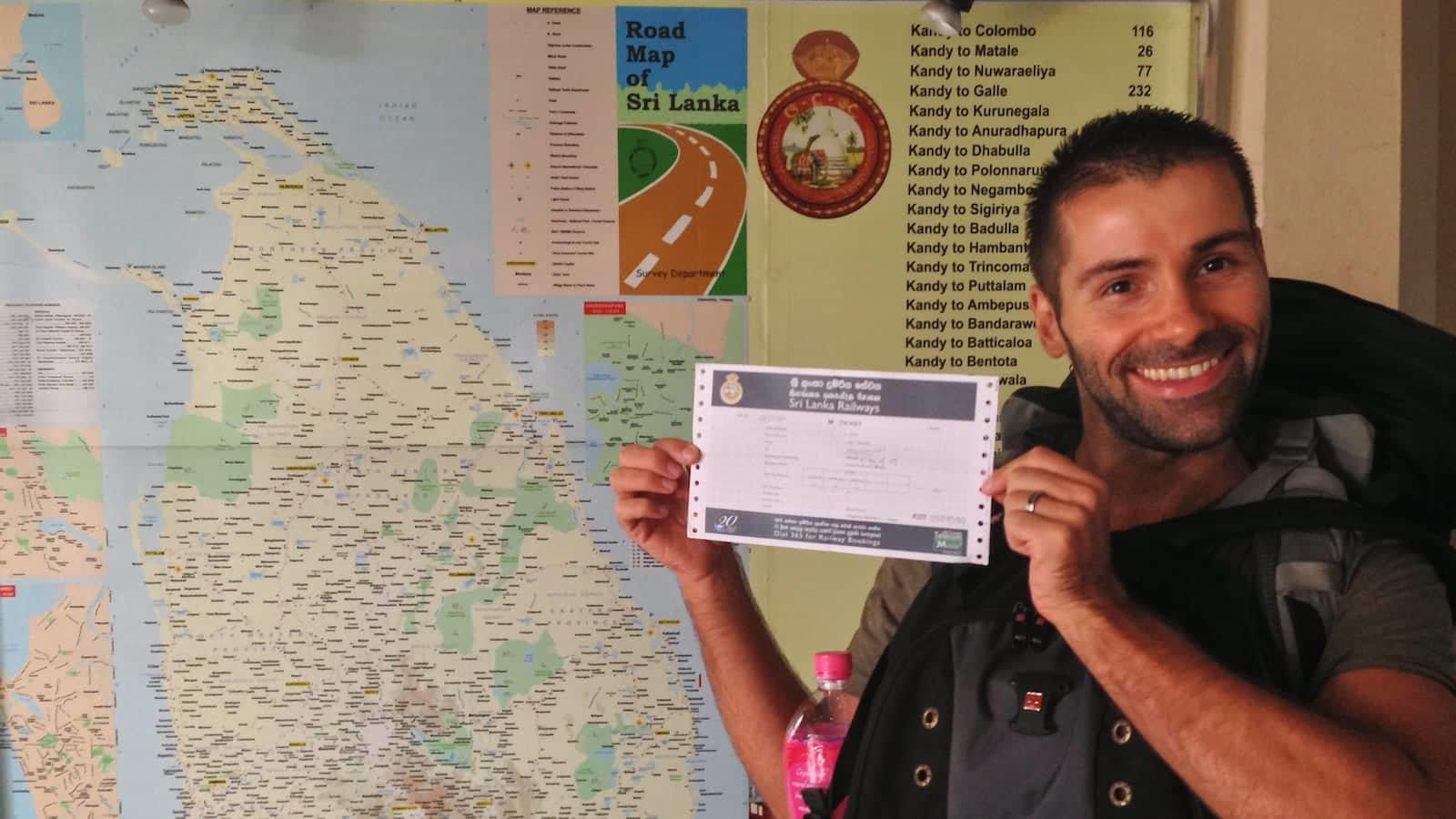 Follow our tips to plan a fantastic (and safe) journey to Sri Lanka
Follow our tips to plan a fantastic (and safe) journey to Sri Lanka
8. Safety Tips for Gay Travelers to Sri Lanka
8.1 Check Government Advice
Check official government advice before traveling.
8.2 Respect Local Laws
Homosexuality is illegal; avoid PDAs.
8.3 Be Aware of Surroundings
Be vigilant, especially in Colombo.
8.4 Avoid Excess Alcohol and Drug Use
Sri Lanka has strict drug laws.
8.5 Don’t Wear Valuables in Public
Petty crime is common.
8.6 Invest in a Good Money Belt
Protect your cash and credit cards.
8.7 How can LGBTQ+ travelers stay informed about safety conditions in Sri Lanka?
LGBTQ+ travelers can stay informed about safety conditions in Sri Lanka by regularly checking government travel advisories and news reports. Subscribing to travel safety alerts from reputable sources can provide timely updates. Engaging with online LGBTQ+ travel communities and forums can offer valuable insights and firsthand accounts. Staying informed allows travelers to make informed decisions and adjust their plans accordingly.
8.8 What precautions should LGBTQ+ travelers take when using public transportation?
Precautions for LGBTQ+ travelers using public transportation include being aware of their surroundings and avoiding drawing unnecessary attention. Keeping valuables secure and avoiding public displays of affection are advisable. Utilizing reputable transportation services like SIXT.VN can provide a safer and more comfortable alternative. Planning routes in advance and traveling during daylight hours can also enhance safety.
8.9 How can LGBTQ+ travelers protect their privacy while traveling in Sri Lanka?
LGBTQ+ travelers can protect their privacy by using a VPN to secure their internet connection. Being cautious about sharing personal information online and avoiding open discussions about their sexual orientation in public spaces are advisable. Using privacy settings on social media and dating apps can further protect personal information. Respecting local customs and avoiding behaviors that may attract unwanted attention is crucial.
8.10 What should LGBTQ+ travelers do if they encounter discrimination or harassment?
If LGBTQ+ travelers encounter discrimination or harassment, they should prioritize their safety and remove themselves from the situation. Documenting the incident, including the time, location, and details of what occurred, is essential. Reporting the incident to local authorities or LGBTQ+ support organizations can help address the issue. Contacting their home country’s embassy or consulate for assistance is also advisable.
8.11 What are some emergency contact numbers for LGBTQ+ travelers in Sri Lanka?
Emergency contact numbers for LGBTQ+ travelers in Sri Lanka include the local police (119 or 118), ambulance (1990), and fire department (110). Contact information for their home country’s embassy or consulate should also be readily available. Local LGBTQ+ support organizations can provide additional assistance and resources. Having these numbers easily accessible can be crucial in case of an emergency.
9. How SIXT.VN Enhances Gay Tourism in Sri Lanka
SIXT.VN offers invaluable assistance to LGBTQ+ travelers, ensuring a safe and memorable experience in Sri Lanka. SIXT.VN addresses these concerns by providing reliable and discreet airport transfer services, gay-friendly hotel recommendations, and customized tour options. By choosing SIXT.VN, LGBTQ+ travelers can explore Sri Lanka with confidence and peace of mind, knowing they have a trusted partner to support their journey.
9.1 What are the specific benefits of using SIXT.VN for LGBTQ+ travelers in Sri Lanka?
Specific benefits of using SIXT.VN for LGBTQ+ travelers in Sri Lanka include personalized travel planning tailored to their preferences, ensuring a comfortable and safe experience. SIXT.VN provides access to gay-friendly accommodations and transportation options. They offer reliable customer support to address any concerns or emergencies. Their local expertise helps travelers navigate the cultural landscape with confidence and respect.
9.2 How does SIXT.VN ensure discretion and privacy for LGBTQ+ travelers?
SIXT.VN ensures discretion and privacy by providing unmarked vehicles for airport transfers and tours. Their staff is trained to respect the privacy of their clients and avoid making assumptions about their personal lives. They handle all communications discreetly and maintain strict confidentiality. SIXT.VN’s commitment to privacy allows LGBTQ+ travelers to explore Sri Lanka without unnecessary attention.
9.3 Can SIXT.VN arrange tours that cater to LGBTQ+ interests?
Yes, SIXT.VN can arrange tours that cater to LGBTQ+ interests, including visits to cultural sites, nature reserves, and local markets. They can customize itineraries to align with specific preferences and interests. SIXT.VN can also arrange for private tours with knowledgeable guides who are respectful and inclusive. Their personalized service ensures that LGBTQ+ travelers have a unique and enriching experience.
9.4 What are some recommended gay-friendly hotels that SIXT.VN partners with in Sri Lanka?
SIXT.VN partners with several gay-friendly hotels in Sri Lanka, including Gomez Place in Negombo, which is a men-only resort. Other recommended hotels include Dickman and Binnacle resorts, also in Negombo, known for their welcoming atmosphere. These hotels prioritize inclusivity and provide a comfortable and safe environment for LGBTQ+ travelers. SIXT.VN can assist in booking accommodations at these and other reputable establishments.
9.5 How does SIXT.VN contribute to a more inclusive tourism industry in Sri Lanka?
SIXT.VN contributes to a more inclusive tourism industry in Sri Lanka by promoting diversity and respect. They partner with businesses that share their values and prioritize inclusivity. They provide training for their staff on LGBTQ+ sensitivity and awareness. By offering personalized services and supporting local LGBTQ+ organizations, SIXT.VN helps to create a more welcoming and accepting environment for all travelers.
Address: 260 Cau Giay, Hanoi, Vietnam
Hotline/Whatsapp: +84 986 244 358
Website: SIXT.VN
By offering comprehensive services and prioritizing safety and discretion, SIXT.VN empowers LGBTQ+ travelers to explore Sri Lanka with confidence and create unforgettable memories.



